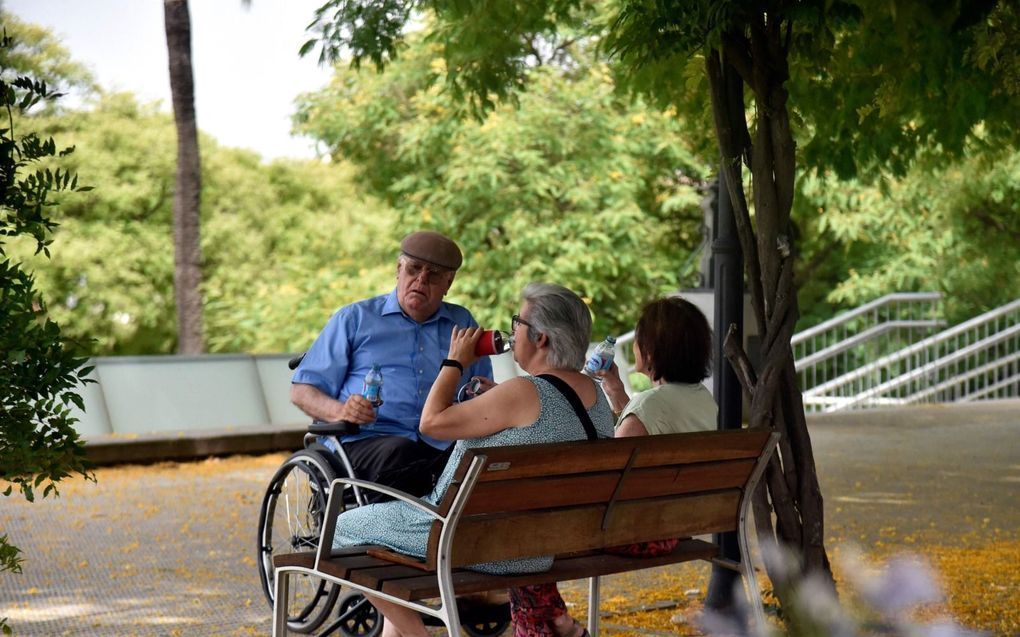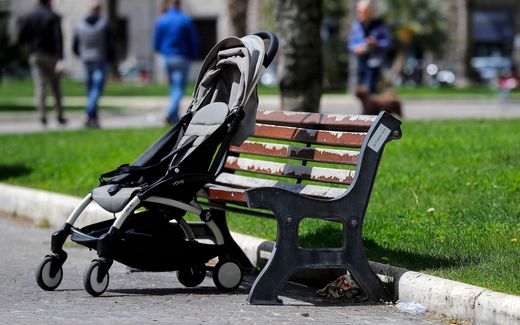Spain is ageing at a rapid pace
26-07-2022
Southern Europe
Lex Rietman, RD

Photo AFP, Cristina Quicler
Southern Europe
In Spain, life expectancy is exceptionally high, and the number of births is extremely low. But the government does not seem to be worried about an ageing population.
He himself is more into dominoes. He plays it every morning with his friends on a folding table on the beach in Barceloneta. But that doesn't change the fact that Pablo Ruiz (79) enjoys watching his friends play a game of bocce this afternoon on Passeig Lluis Companys, in the heart of Barcelona.
The game is being played passionately. There is even a heated discussion between two players, probably a disagreement about the pétanque equivalent of offside or not. But it ends with a hiss. The game continues without steel balls being thrown at the heads of the opponent. Playing pétanque is not without risks.
This is the second part of a two-part series on demography in Europe. On Monday, we published an article on Russia.
Not for anything, says Ruiz, but bocce is not a local sport. "From home, we play dominoes or card games here. Bocce was brought here by Spaniards who went to France in the 1960s and 1970s to work as guest workers. After they returned, they made it popular here." And especially among older men. All the players, except one, appear to be well past retirement age. Most of the audience as well, for that matter.
Friends
Ruiz has a good life, he thinks. He has an "average pension" and his own house, a bit further down the road near the Columbus monument. He doesn't have to worry about his family because his daughters have good jobs. "However, I've been a widower for two years," he says. "And now I often feel the loneliness."
Ruiz lives alone. He wouldn't have it any other way. After all, his daughters should be able to live their own lives. He is still healthy and can take care of himself. And if the worst comes to the worst, he will surely be able to count on his daughters. Ruiz is an experienced pensionado. At sixty, he retired after working for forty years in a pet food laboratory.

He has never felt left out of society in the two decades since. According to him, that has everything to do with the Spanish lifestyle. "Here, we are used to communicating a lot with each other," he says. "In other countries, people live more secluded. Here we think you don't have a life if you don't go out and meet up with friends."
Life expectancy
According to the World Health Organisation, Spain has the highest life expectancy in the world after Japan, Switzerland and Singapore. The average Spaniard lives to be 83.6 years old. Men live to be 80.9 years old, women 86.3. A study by the University of Washington in Seattle, USA, predicts that Spain will be number one by 2040. One reason is a good and widely accessible system of public health care. A second is the so-called Mediterranean diet, rich in fresh and natural foods, and relatively limited consumption of processed and ready-made foods.
If food is the deciding factor, it remains to be seen whether Spain will ever take the lead in the world rankings. Among the younger generations, the Mediterranean diet is rapidly losing ground. The sometimes long traffic jams for things like McAuto give an idea of that. Meanwhile, children's eating habits are beginning to become a source of serious concern. Spain leads Europe in obesity among minors. Nearly one in five children suffers from obesity.
But for the time being Spaniards are getting very old, and at the same time the country has an extremely low birth rate. With only seven babies per thousand inhabitants per year, Spain, is among the ten least child-rich countries on earth. The decline is spectacular: in 1960, 22 babies were born per thousand inhabitants.
Secularisation, contraception and the rising prosperity of the past half century have contributed to this. But today, prosperity is a factor that works in the opposite direction. Only families with a more or less generous income can afford the luxury of two or more children. The government barely steps in. Spain dangles at the bottom of Europe regarding social and fiscal family policy. Something like child benefits is unthinkable here.
Solidarity
A high life expectancy combined with a low birth rate naturally gives us pause for thought about the future. Not only demographically. Socially and economically, Spain is also facing a challenge of unprecedented magnitude. The country is ageing much faster than other European countries. One would think that the issue would therefore be high on the political agenda. But this is not the case. The Ministry for Ecological Transition and Demographic Challenge has an annual budget of 12 billion euros. But only 56 million of that is earmarked for the Demographic Challenge Department, less than half a per cent.
Moreover, that money goes mainly to short-term measures to counter depopulation in rural regions. A policy vision of how to to tackle the problem of the ageing population in the long term is greatly lacking. The horizon reaches no further than the next elections.
Anyone who enters "ageing in Spain" into a search engine will find mostly pieces by scientists and banks. The financial sector has a particular interest in the issue. The reason is simple: there is a lot of money to be made. The Spanish pension system is a public pay-as-you-go system. That is, today's pensions are paid from the social contributions of those currently working.
The problem of this intergenerational solidarity arises as there are fewer and fewer working people to pay for the pensions of more and more elderly people. For years, the Spanish banks have been preying on the fat chunk that a privatized pension system would mean for them. They have published one study after another to prove the unsustainability of the current system.
What is certain is that without additional income from taxation, pensions would eventually have to be reduced. The minimum pension for someone who lives alone and has never paid contributions to the Social Security system is already not much: 420 euros. Those who have paid contributions for a considerable number of years can, in most cases, count on two to four times that amount.
Travel
Ruiz has never felt excluded from society since his retirement, partly due to an active social life. And even though the global trend that everything has to be fast, young and flashy does not pass Spain by, Ruiz feels respected by the younger generations. Perhaps this respect is also fueled a bit by the language. In Spanish, someone like Ruiz is a "persona mayor", a bigger person. It means the same as an elderly person or a senior citizen, but it still feels different.

A great tool to keep the elderly from withering away behind the geraniums is the Imserso. This Institute for Elderly and Social Services organizes a program where the elderly can travel for a bargain price within their own country, including a hotel with a full board.
The idea was born from the idea that thousands of hotels would otherwise have to close outside the tourist season and that you can use the money the government saves on unemployment benefits to subsidize trips for people who can vacation out of season. Imserso's trips are wildly popular. Retirees take advantage of them en masse, alone, with their partners or in groups. New friendships and sometimes even relationships are the result.
In addition to the travel-loving elderly, Spain also has the activist elderly. They are united in the Yayoflautas, a group of pensioners who felt akin to the movement of the "indignados" (the indignant) from 2011. Initially, they took to the streets for a dignified pension but soon expanded their scope of action to include stopping evictions and other social struggles.
Signature campaign
And then we have Carlos San Juan. Earlier this year, this 78-year-old Valencian made all the TV news and front pages with his "I'm old, not stupid" campaign. With this, he protested against the denigrating treatment that older people have to endure in many Spanish bank branches because they cannot keep up with the digitization of banking services. The impatient and sometimes downright irritated behaviour of bank employees towards the inability of older customers to handle ATMs was recognized by many Spaniards.
On the change.org site, San Juan wrote that he had sometimes felt humiliated when he had to ask for help from a bank employee. The latter then treated him as if he were an idiot for not being able to use the machine. San Juan's action for a "more humane treatment" of the elderly by the banks met with great sympathy in Spanish society.
He collected 600,000 signatures. Economy Minister Nadia Calviño rushed to announce steps against the "digital exclusion" of the elderly. Another world is possible, even if you are almost eighty.
This article was translated by CNE.news and previously published in Dutch daily Reformatorisch Dagblad on July 6th, 2022.
Related Articles





